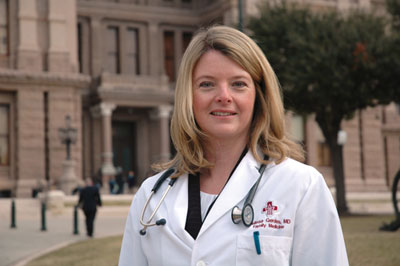Capitol Update: 82nd Texas Legislature convenes in Austin
Capitol Update: 82nd Texas Legislature convenes in Austin
posted 01.12.11

Day one of the 82nd Texas Legislature is in the books, and after weeks of political posturing and boisterous calls by tea partiers to “Oust Straus,” the Texas House voted to install Rep. Joe Straus, R-San Antonio, as Speaker for the second time. Gov. Rick Perry addressed the Senate and the House, pledging to work for a balanced state budget without raising taxes, and he designated the legislative issues of sanctuary cities and eminent domain as emergency items.
Shortly after being sworn in as president pro tempore of the Texas Senate, Sen. Steve Ogden, R-Bryan, delivered a stark assessment of perhaps the most pressing issue confronting lawmakers, the state budget. Earlier in the week, Texas Comptroller Susan Combs announced that general revenue for the 2012-2013 biennium will likely be $72.2 billion, $14.8 billion less than the general revenue budget for the current biennium. She estimated the shortfall in the current biennium would be $4.3 billion, but she did not quantify the size shortfall expected in the next biennium.
Ogden, who chairs the Senate Finance Committee, told the audience in the Senate chamber that since 81 percent of general revenue appropriated by the Legislature goes to education and health and human services, it is impossible to balance the budget without cutting those two areas. “How we deal with Medicaid will determine how the rest of the budget goes,” he said.
Last session, lawmakers appropriated $44 billion in all funds to the Medicaid program; 70 percent of that came from the federal government and 30 percent came from the general revenue budget. The federal match was richer than usual because it included money from the federal stimulus package. Ogden predicted the match in the next biennium would be closer to 60:40, a difference of approximately $4.5 billion. “Our first job, senators, is to figure out how to save Medicaid.”
The exact size of the budget shortfall confronting lawmakers is a point of contention. The Center for Public Policy Priorities has calculated the cost of providing existing levels of services in the coming biennium at $99 billion, which puts the shortfall at $26.8 billion.
Talmadge Heflin of the Texas Public Policy Foundation argues that figure is based on the assumption that the state should continue providing the same level of services as in the past. He says the impending shortfall is somewhere between $12 billion and $16 billion, according to a story by John Reynolds of Quorum Report.
The Legislative Budget Board should release the base budget for 2012-2013 in a matter of days, which will serve as the starting point for budget writers and provide a better measurement of the shortfall.
With the contentious redistricting process and a host of hot-button topics on the docket, the session promises to be dangerous for family medicine. Nurse practitioners have vowed to press for independent practice; lawmakers will surely reconsider changing the ban on the corporate practice of medicine; the Texas Department of Insurance will undergo sunset review; and as Sen. Ogden said, health and human services, and education are sure to be cut, which means physician fees for Medicaid and CHIP, and funding for graduate medical education will be under the knife.
You can help TAFP this session by signing up as a Key Contact and by serving as Physician of the Day at the Capitol. TAFP President Melissa Gerdes, M.D., cared for patients as Physician of the Day on the session’s opening day. Several days are still available, so check out the calendar and volunteer.